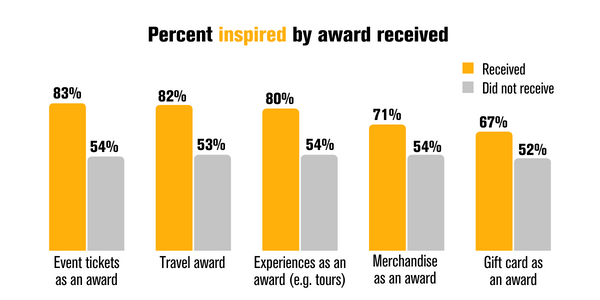Four Pillars, One Culture: The Blueprint for Employee Engagement
Written by: Tom Nash
(View Author Bio)
The world of work is constantly changing due to the latest trends: return to office, retaining employees, quiet quitting and performance, DE&I, ESG, talent mobility… it’s hard to keep up.
At BI WORLDWIDE, we conduct an annual New Rules of Engagement® research study to understand the current work experience, especially the influence of company culture.

Recently the research team from BI WORLDWIDE conducted a new study on several relevant topics including culture, optimising remote work, reasons why people leave and mental health. These insights were collated from thousands of employee interviews and surveys from large organisations globally from different audience groups from deskless employees, salespeople, STEM employees and leaders.
Much of BI WORLDWIDE’s research is in engagement, and to gather insights on engagement we think of three things:
Commitment - is your willingness to stay with your organization, but also if you're proud to work there, would you recommend working there?
Effort - is the effort you're giving you know for your customers as well as on behalf of the organization.
Inspiration - beyond just working hard, do you feel inspired at work? Are you motivated? Are you feeling innovative?
BI WORLDWIDE identified 12 factors that really predict these three outcomes and that's what makes up our New Rules of Engagement® model. This model is reviewed, re-examined and tested on a regular basis to adjust to updated findings, new challenges and expectations.
Culture eats strategy for breakfast
One particular outcome that we're hearing from our clients is culture. Creating and maintaining a great culture has become challenging, especially with people being remote and how things keep changing in the workplace. Organisations have had 'ah-ha' moments realising just how important culture is when it comes to engagement and reducing turnover. Organisations are really thinking about how to have a great company culture and what that looks like.
Related article: Culture Conversations
This year BI WORLDWIDE specifically investigated the key indicators and predictors of building a positive work culture. Our global research was abundantly clear, culture can be a key differentiator in business success. Our research indicated four pillars that strongly influence a great culture at organisations.
- They believed that they had great leadership.
- They felt connected to the purpose of the organisation.
- They felt they belonged and they felt recognised when
- Were confident recognition was delivered fairly at work.
What does great company culture look like?
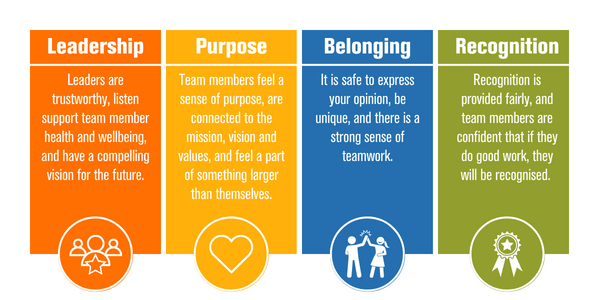
Leadership
Leadership has an influential impact on company culture. Organisations that have a great company culture are likely to have leaders who are trustworthy, listen, support team members' health and wellbeing, and have a compelling vision for the future. Leaders are willing to make an investment in their people. Being an inclusive leader has become a vital quality more than ever before.
- Those with inclusive leaders are 10 times more likely to say they belong and 12 times more likely to find work inspiring.
- When we asked managers, 88% of them said I want to be an equitable and inclusive leader. But when we asked employees to rate their managers, only 52% of employees rated them as such.
How can we help managers to be inclusive leaders?
Our research found that all employees and leaders care about inclusive leadership. BI WORLDWIDE’s inclusive leadership index can give managers more feedback on where they need work and where they can get support by making these things on this list easier to do with the right systems and processes in place.
- Listen to everyone on the team.
- Provide unbiased feedback.
- Evaluate team members with consistent criteria.
- Understand employees.
- Divide work accordingly to abilities.
- Make decisions with employees’ interests in mind.
- Recognise good work.
- Understand and advocate for the principles of DE&I.
The key questions to ask are how can we help managers to listen and provide unbiased feedback, and evaluate people with the same criteria? Do they understand and advocate the principles of DE&I? How can we help them to recognise employees?
Related article: Managers Matter
Leadership supporting wellbeing and mental health
Another big aspect of this leadership pillar that came out of the research was having an organisation that really supported the wellbeing and mental health of their employees. Employees who felt supported in this way saw between a four and 11 times greater likelihood of high commitment, high effort and high inspiration at their organisations.
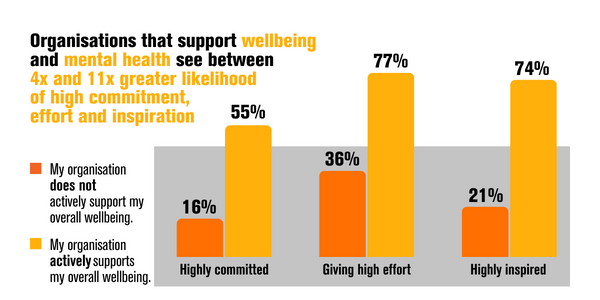
Related article: Supporting Employee Health and Wellbeing
Purpose
The next pillar is purpose, and as the research will again make clear, employees work for more than a paycheck. Obviously, a paycheck and benefits are important, but employees hunger emotionally for additional things beyond pay and benefits. It is how great organisations separate themselves from good organisations.
Employees want to be with a company that has a clear mission statement and values. When the team from BI WORLDWIDE goes to visit organisations, the team often see mission statements and values prominently posted, which is great, but these values need to go beyond the expensive wallpaper and be felt in the lives of everyone.
What does purpose look like beyond valuing the mission? It is the feeling of being a part of something bigger than yourself and those who make this connection are often more committed. Where purpose is evident, employees are giving higher effort, but the largest impact from our research was on inspiration.
Purpose Drives Inspiration
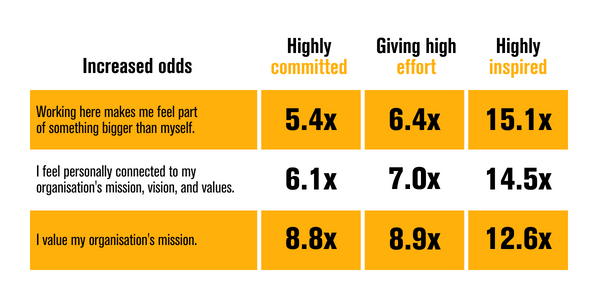
Missions are written to be nice. Of course, we like them, but what's harder is showing people how exactly what they do each day impacts that mission. And really helping them to feel connected to something bigger than themselves. That is something that's not necessarily easy to do, especially in certain roles. This gets also more difficult in larger organisations. Our benchmarks show as the organisation's size increased, the connection to a larger purpose was less likely to happen. We also see a greater struggle for people who work in locations like call centres, retail stores, and remote work.
For all workers, but especially for these groups, we need to be more intentional about communicating the impact that they're having, really showing them how they can connect back to that purpose and mission. And one way we can do that is through recognition.
Our research found that 89% of people who have recently received recognition that's aligned with company values feel connected to the purpose versus just 65% of people who did not receive that type of recognition.
Align with company values
Recognition aligned with values makes an impact:
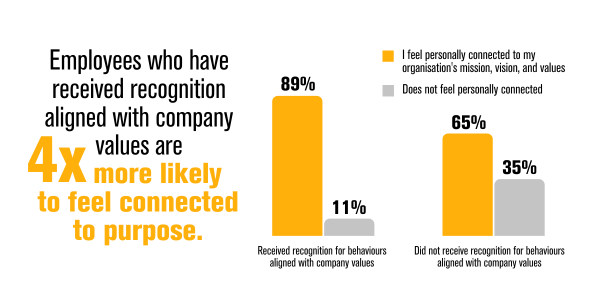
Recognition that is strategic and aligned with those values is 4x more likely to feel connected to purpose. Consider today whether you can tell someone how the work they are doing is making a difference in your organisation's mission. Not only will that drive purpose, but it will also create connections.
Belonging
The third pillar is belonging, and our research demonstrates the importance of creating a culture that supports and values every person in the organisation. Where there is a distinct lack of alignment with this pillar on not finding psychological safety in the workplace, and the implications of not feeling this pillar can be devastating.
From the insights, 71% of people feel like they belong at their organisations, but that still leaves 29% that don’t feel that way and do not agree with this statement. How do we support these individuals in improving their feeling of belonging? Our yearly inclusion and wellbeing index helps us determine individual items that predict belonging.
Related Article: How to experience the true value of diversity, equity and inclusion
Inclusion and wellbeing index:
- 76% - Strong sense of teamwork
- 73% - Confidence good work will be recognised
- 73% - My manager supports me
- 73% - Opportunities to develop my skills
- 72% - Trusted with important decisions
- 71% - Able to bring my full set to work
- 70% - Organisation is open-minded
- 68% - Personally connected to mission, vision and values
- 67% - Organisation supports wellbeing
- 67% - Optimistic about my future here
- 66% - Leaders listen to employee needs
- 63% - Able to accomplish more here than elsewhere
Overall, to foster belonging, leaders should listen, support and show what’s possible.
BI WORLDWIDE use these benchmarks with our clients to determine whether they are ahead or behind the curve, which is really important in knowing how your team is feeling about each of these areas. Just focusing on doing any of the inclusive index items can really make a difference.
We are starting to see how leadership, purpose and belonging are intertwined when we think about culture. Belonging is influenced by the connection to the mission that supports overall wellbeing, and we can see how the leadership pillar is about seeing their future, and their career path, listening and providing that sense of accomplishment.
That sense of accomplishment is impacted by the next culture pillar, which is recognition.
Recognition
A great company provides recognition to everyone in the organisation. It ensures people's voices, even from the bottom up, are really heard at the organisation. We see this in the quantitative data as well, those who are confident that if they do good work, it will be recognised, were more than 10.2 times more likely to say they have a great company culture where they work now.
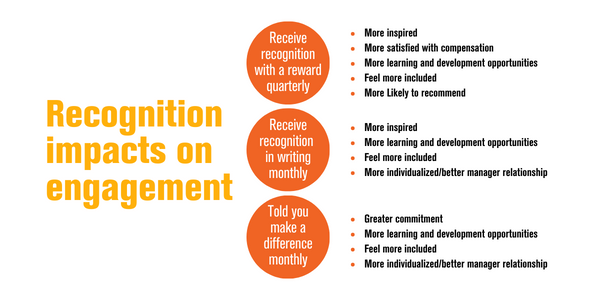
There are a number of levers that we can pull to help people to feel recognised at work, one of which is providing recognition with a reward. So we asked people, did you receive recognition with a reward in the past three months?
People who did felt more inspired. They were more satisfied with their compensation. They felt they had more learning and development opportunities. They felt more included and they were more likely to recommend their organisations as a great place to work.
We also asked did you received recognition in writing with no rewards in the past month. In writing, these people again felt more inspired, more learning and development, more inclusion. In addition, they also felt like they had a stronger manager relationship and felt they had better individualisation of that work experience.
When we asked, did you get told you make a difference at work? People who were told they made a difference at work in the past month were more committed to their organisations and wanted to stay than others. They also felt the most valued and they had more meaning and purpose in their work. Somebody was reminding them how what they do each day is really making a difference to the organisation.
Recognition - Remote Workforce
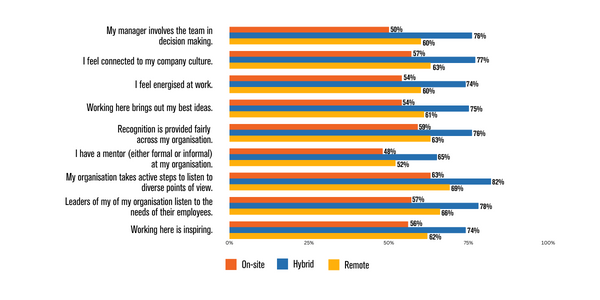
There are a number of challenges that can make a great company culture, just more difficult to attain and one that we're seeing a lot of increasingly is the remote workforce compared to those working hybrid. Our findings indicated that those working remotely were less connected to the company culture, and less energised and inspired. They were less confident that leaders were kind of doing the right thing for them.
This certainly isn’t suggesting we shouldn’t work remotely, but instead, the real question is what can we do to support people who are working remotely, knowing they might feel less connected to company culture? What can we do to kind of bring them back in?
There are a number of things organisations can do and one of which that we saw made a really big difference was receiving recognition for behaviours aligned to the company values.
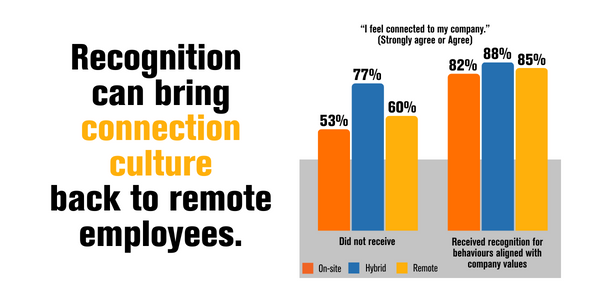
When receiving recognition aligned with these values, remote workers felt just as connected to their company culture as people who are working hybrid and on-site. Having a culture of recognition strongly aligned with company values can bridge that gap for people who maybe aren't feeling as connected to the company culture.
Recognition – Celebrating Moments
In addition to recognising behaviours or recognising accomplishments, recognising an array of moments also has a strong impact. To determine this link, we ask people if they had experienced, for example, a birthday, promotion, newborn, anniversary, or marriage in the last year (see below), and if those moments were celebrated at work. We found a clear link between celebrating these moments and a high employee Net Promoter Score. Highlighting if you are celebrating employees even for the personal things that can really make a difference.
Celebrating moments builds promoters
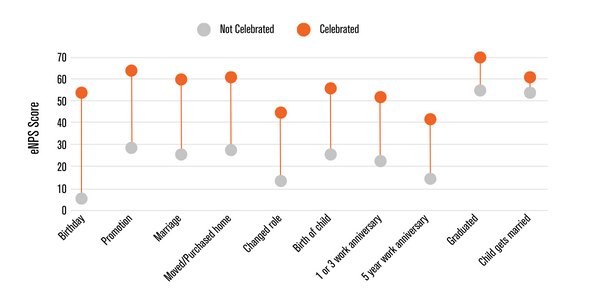
Related article: Celebrating Moments That Matter
Recipients of experiences are the most inspired.
It is clear organisations should want to recognise people based on the insights above, and then to the degree that we can individualise those things can be even better. When it comes to meaningful rewards, what type of rewards has the strongest impact on inspiration?
Well, it is no surprise that all types of rewards as shown in the graph experienced a lift, but when it comes to employees being most engaged and inspired the non-cash awards provide far more lift than gift cards. These patterns continue time and time again, which is because we human beings feel those kinds of emotional things in a non-cash award, whether that be an opportunity to travel or some other activity that can be far more inspirational. Again and again, our data supports that.
Related article: Rewarding and Motivating People in Today’s Workplace
Ripple Effects of Giving Recognition
We tend to spend a lot of time thinking about how it feels to receive recognition so it is worth reminding ourselves that giving recognition is really great too.
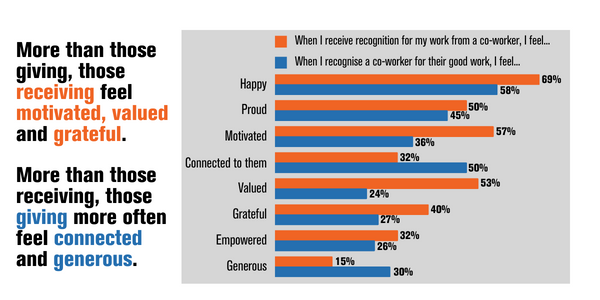
As illustrated above, both giving (blue) and receiving (orange) recognition makes employees feel happy and proud. What is amazing is with giving recognition the connection you feel with the person that you were giving recognition to is much higher. 50% of people who are giving, feel really connected to that person.
Our research and detailed insights make a powerful case that to build a strong company culture, organisations need to implement a formal recognition program to ensure leaders and employees have the tools to be empowered to lead, drive company values, and enhance the feeling of belonging.
Ready to create a recognition program that is meaningful to your employees?

